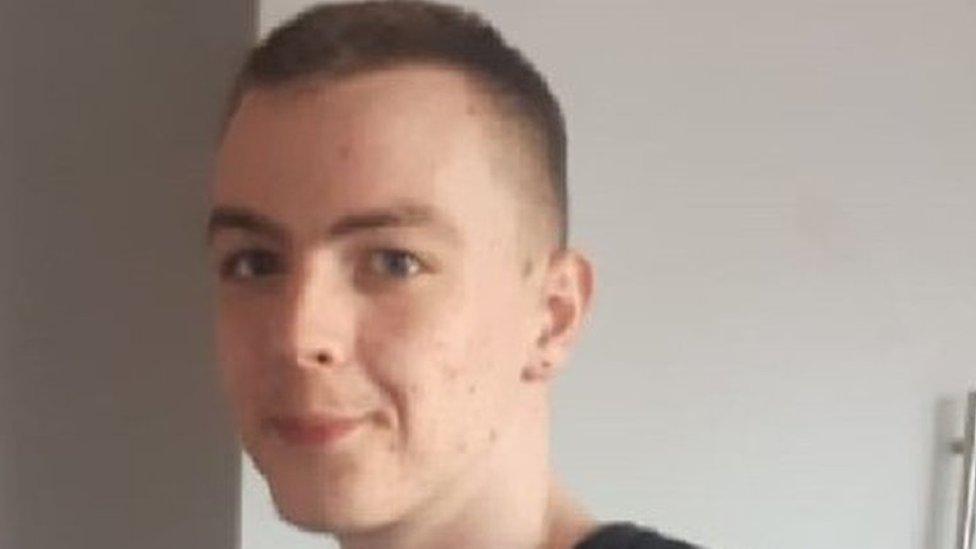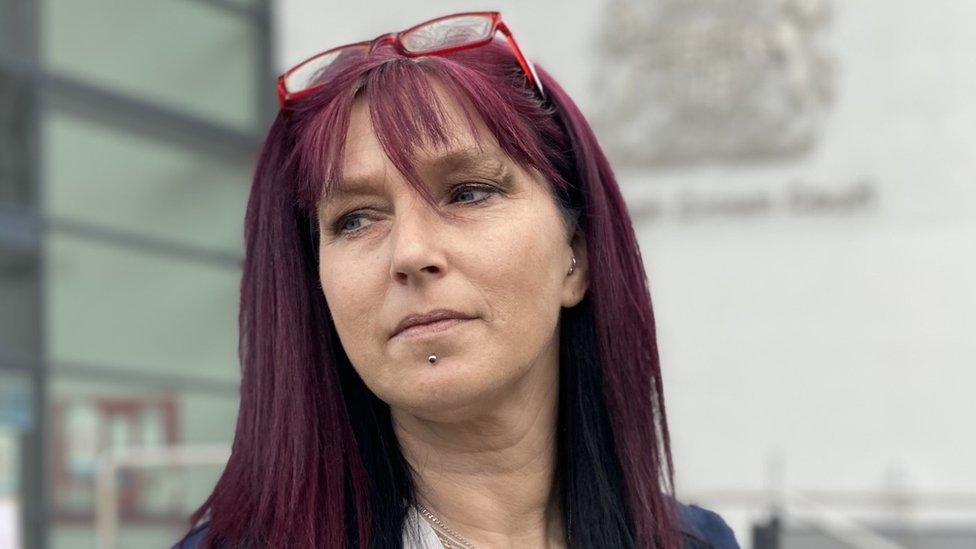Joe Pooley: Lack of prison recall 'contributed to' murder
- Published

Joe Pooley, 22, was set upon by two men while staying in bed and breakfast accommodation
A vulnerable man was murdered by a violent offender who was "at large" and should have been in prison, a coroner has said.
Joe Pooley, 22, was thrown in the River Gipping in Ipswich and held under the water in August 2018.
Three people, including Luke Greenland, were jailed for his murder last year.
Suffolk coroner Jacqueline Devonish heard Greenland was considered a "high risk" to others and was in breach of his licence when he killed Mr Pooley.
She said Mr Pooley was "more likely than not" to have not been murdered had one of his three killers been recalled to prison adding: "I find it on the balance of probabilities that Greenland being still at large more than minimally, negligibly or trivially contributed to his death."

Sam Nicholls said her son wanted to live independently
During 10 days of evidence, the inquest in Ipswich heard Mr Pooley had global development delay and suspected autism.
He grew up in foster care and by his 16th birthday was placed in independent accommodation without the one-to-one support he needed.
His mother Samantha Nicholls told the hearing she made repeated pleas for support for her son, including telling local authorities in 2015 she feared he would be "bullied to death".
In May 2018, Greenland - who later changed his name to Sebastian Smith - was released from prison after assaulting a police officer, and was placed on home curfew.

Sean Palmer, Luke Greenland (also known as Sebastian Smith) and Becki West-Davidson are serving minimum terms of between 17 and 21 years in jail
The inquest heard he posed a "high risk of serious harm to the public" and within a month had removed his electronic tag, which meant an automatic recall to prison.
A revocation notice should have been issued in July, the coroner said.
She added there was" insufficient evidence" to conclude that the authorities ought to have known about the specific risk to life, which involved a motive of "sexual jealousy".
'Lapses and delays'
A trial last year heard Mr Pooley was lured out of his guest house and set upon in the early hours of 7 August.
His body was found face-down in the river by a dog walker on 13 August.
The inquest heard a Safeguarding Adults Review (SAR) last year cited 15 areas in need of improvement, including in social services, probation and police.
Ms Devonish also found failings and said errors, including "lapses and delays" in Mr Pooley's case were "individual ones" and not "systemic".
She added shortcomings had been identified and changes made by the relevant authorities.
She concluded Mr Pooley was unlawfully killed and that one of those responsible had a history of violent offending and should have been recalled to prison before the killing.
Ms Devonish praised Ms Nicholls for her "remarkable resilience" over the past four weeks, while listening to "harrowing details of her son's journey towards his death".
The fact that she worked with vulnerable people in the community "would have added to her feeling of despair and loss", she said.
After the hearing, the Suffolk Safeguarding Partnership, which conduced the SAR, said "We have been working closely with those agencies to ensure the learning is being embedded to make systems safer for people like Joe, and we will implement all the recommendations including those actions determined by coroner, however long it takes."

Find BBC News: East of England on Facebook, external, Instagram, external and Twitter, external. If you have a story suggestion email eastofenglandnews@bbc.co.uk
- Published4 July 2022

- Published24 May 2021

- Published19 March 2021

- Published14 October 2020

- Published21 July 2020
